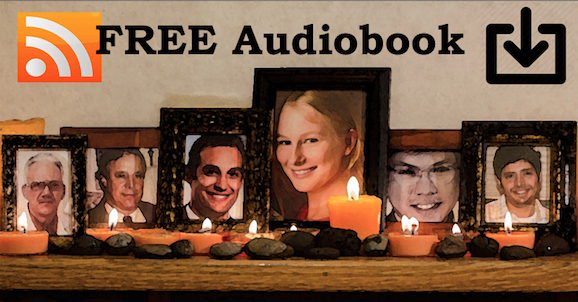
This week a distraught mother calls me about her son. His professor (at a US med school) repeatedly tells medical students they are “too stupid to be doctors and should kill themselves.”
A physician friend shares that the same guy tells his internal medicine residents weekly (for 3 years!) that they are stupid and “should kill themselves.” Even bullies other instructors. Ongoing for decades. Yet nobody stops him. Why? His family owns the med school.
Yet he’s not the only psychopath on the loose. Other med school instructors tell students to die by suicide too—with step-by-step instructions.
“An anatomy professor did inform us that we would commit suicide at a higher than average rate and told us from the lectern how to accomplish it successfully,” reports one doctor-in-training. “I considered following the instructions on three occasions: once in my third year, once as an intern, and most recently when my four-year-old patient died.”
Encouraging anyone to die by suicide is sick. Giving instructions is deadly. Getting a salary to do it is criminal.
Dr. Kelly Sennholz shares one of the most shocking scenes I’ve ever heard: “After one of our residents killed himself, two of my professors sought me out to gloat that their abuse had resulted in his death. They were PROUD OF IT.”
No remorse. No punishment. Just a trail of human debris.
So why aren’t these guys fired—or imprisoned after students follow their orders? Seems many bring in so much money to the medical school or hospital that nobody has the guts to stop them. Until now.
So what happens to bright and compassionate souls when they are called stupid idiots—when they lose hope for their future?
“My ex-boyfriend from medical school killed himself,” says Dr. Sheila Mundy. “He got a coveted orthopedic residency. He had type 1 diabetes and his new attending told him he would never make it because of the diabetes. He shot himself a few days in. Assholes!”
Those who survive often have lifelong mental health sequelae. Anna, a retired surgeon, shares:
I was happy, secure, and mostly unafraid until med school. I recall in vivid detail the first orientation day. Our anatomy professor stood before an auditorium filled with 125 eager, nervous, idealistic would-be healers and said these words: “If you decide to commit suicide, do it right so you do not become a burden to society.” He then described in anatomical detail how to commit suicide.
I have often wondered how many auditoriums full of new students heard those words from him. I am sure someone stood in front of us and told us what a wonderful and rewarding profession we had chosen. I do not remember those words. But I do remember how to successfully commit suicide—with a gun.
One month later, on the eve of our first monthly round of six exams in one day, I had my first full-blown panic attack. I had no idea what was happening. I thought I was losing my mind. I took a leave of absence and made up excuses. I returned untreated with maladaptive compulsive behavior, completed med school, survived the public pimp sessions, and all the rest.
No one ever suggested that the process was brutal, or the responsibility frightening, and no one offered us help. I have maintained contact with only one colleague from med school, so I do not know how the others fared.
Through the many years of training, and through what would appear to the observer a successful career in a surgical subspecialty and now into retirement, I have carried the anxiety, and the depression, and the fear. Perhaps entirely unrelated to those first days in med school, but still something happened to me, and probably to many of us, that changed us forever. I still remember how to successfully commit suicide, because someone who had power over me at a vulnerable time described the details. And we wonder why . . .
Every day medical students are still being threatened, intimidated, and wounded by the very people they entrust with their lives (plus they pay hundreds of thousands of dollars tuition for this!). Mike writes: “Just had my orientation to the second year of medical school today. Was lectured for over an hour about how our lives don’t matter. Only our patients lives. Threats of letters of unprofessionalism and fear fear fear yelled at us by a dean. We haven’t even started second year. It’s insane.”
Carla even wrote her suicide note before reaching out to me yesterday:
Hi Dr Wible. I’ve been really struggling in med school recently. It’s been a tough year, and it just feels like I have no support. As if the lecturers want to see you struggle and fail. I’ve been suicidal throughout this year, and even went so far as planning the deed and even writing a letter. The only thing that saved me was that I wasn’t going to let medicine become my downfall. I’ve considered whether it would be healthier for me to quit, but then I remember all the dreams I had as a kid and how I still really want to help people and make a difference in the world. However, I’m scared that the next time someone tells me I’m not good enough to become a Dr, I’ll believe them and be pushed over the edge, because what else am I good enough for then?
Feeling outraged? Then do something. Your silence perpetuates the abuse. Speak up. Report abuse at your medical school or hospital now. Are you a med student or a doctor who is suffering ? Contact me. Confidential help is available 24/7.
Download FREE Physician Suicide Letters—Answered.

Pamela Wible, M.D., is author of Physician Suicide Letters—Answered. Since 2012 she has been running a suicide hotline for medical students and doctors. View her TEDMED talk Why doctors kill themselves.















No way ! It is not even possible to me to believe this, unless those ” professors” are psychopaths and in this case, they have no business being doctors. There is a simple test, MMPI test that needs to be part of the graduation process of doctors to R/O psychopaths and sociopaths. Not only this can save the lives of medical students, this will save lives of patients because such “non-humans” have only one concern: their image. If they have to choose between the best interest of a patient and their image, we know what they will choose. Empathy and caring is necessary for all physicians. Easy test to do at the beginning of a medical student application! A sine quo non!
Hi Dr. Wible (or whomever),
My name is Ben, and I’m writing here because I can’t think of anywhere else to go. Since getting accepted to medical school a few weeks ago (and even before) I’ve been wracked with near-constant anxiety, stress dreams, panic, and a decreased ability to concentrate and sleep at the prospect of attending. I have a history of self harm, and have this deep-seated worry that I won’t survive medical school intact, whether that means failing or quitting, one way or another. But I also feel deeply that I won’t let myself decline the acceptance or quit once I’m in, and will not stop unless pushed all the way over the edge. I feel there is no way out except forward, and I am terrified. Will I ruin my life by going? Have other students/physicians felt this way and made it through, and can they really recommend that I go anyway? I don’t necessarily post this looking for answers, but merely to demonstrate to anyone else who finds this article that someone else might feel the way they do, and that they are not as alone as they feel. I hope that person finds this comment, and knows that I’m in the boat with them.Thank you (and other commenters) for the writing that you do.
You can contact me via my contact page and I can help you find someone who can assist you. You need to be proactive. You need maximal support and a therapist going through medical training. Don’t wait and just think things will “get better” on their own.
Really? C’mon, it is easy to believe. I’m a medical resident at 32, and I’ve seen this many many times. I completely understand the purpose of putting students under stressful situations they may face in “the wild”. It is called mental training/hardening I guess. What I don’t get is the need to humiliate, to suggest suicide, to drop to the personal level of insults…
It has absolutely nothing to do with strengthening their students. That’s the excuse they tell, but true hardening stops once the limit is reached. A close attention is devoted. You put people to field test and then assist so the pupil may recover to endure even more. Nothing of this happens with medical professors, as they don’t stop harassing (subtle difference) you until you’re dead or severely damaged, many times in a weaker state of mind than before.
If you’re still in doubt, pay attention to the work environment of these people: many RNPs and all will complain, leave their jobs, because of abusive physicians that are their bosses. I’ve talked to many, and they are not taking classes. It is harassment, pure and simple.
The medical profession is overwhelmed with these types, unfortunately. The only way I found that works is by keeping your mouth shut, accept everything, nod along as if they’re Gods. In short, massage their egos. Before medical school I thought people were overdimensioning. Silly me, these people are much more mentally wrecked than my young mind allowed me to realize at the time.
Good thing is that I was raised in a good HOME. I know what kind of professional I do NOT want to be.
Not knowing further details, the attendings in question need to be corrected for being malicious except (further information needed) the anatomy professor, who I suspect was doing a CSI step by step for entertainment value. It was tasteless and probably worthless, but I doubt it was for the purpose of encouraging self harm. That presentation needs to be removed.
As seasoned physicians, we forget it takes years to adapt to the day to day work of medicine -living with other peoples disease even when we are unable to do anything about it. I remember saying to a young attending how inadequate I felt as a 3rd year med student, and he laughed and said “well, if we knew everything at the beginning of the 3rd year, there wouldn’t be residencies. There’s a reason it’s called medical ‘practice’.” (kind of like yoga) The same dr told me when I graduated – “congratulations, you are now 3 weeks behind for the rest of your career”. Yep. For me, accepting the insanity and redefining limits has been very helpful. At the end of the day, I want to know I did the best I could with the innate and acquired tools I have and the available teamwork, even if the outcome is not successful. And yes, I do cry occasionally with or about patients. It’s called being human.
In our first anatomy lecture in the first week of medical school in 1989, Professor Norman Eizenberg looked at the full auditorium of medical students and told us that the previous year a medical student had committed suicide the night before the anatomy exam. He asked in a serious voice: “Do you know what they call someone who graduates at the bottom of their medical class?”
Silence.
He replied, “Doctor!”
We all smiled with relief.
He continued, “Please don’t take your study so seriously. Please come and talk to me if things are getting on top of you. No exam is worth dying for.”
Despite some other less sympathetic teachers at times during my training, I always remembered his message, and his empathy.
Appreciate his willingness to be supportive to these young souls. Obviously made a big impact on you if you remember this 30 years later.
Medical Students & Residents, I am a practicing pediatrician. I am happy to offer you support if you are feeling overwhelmed.